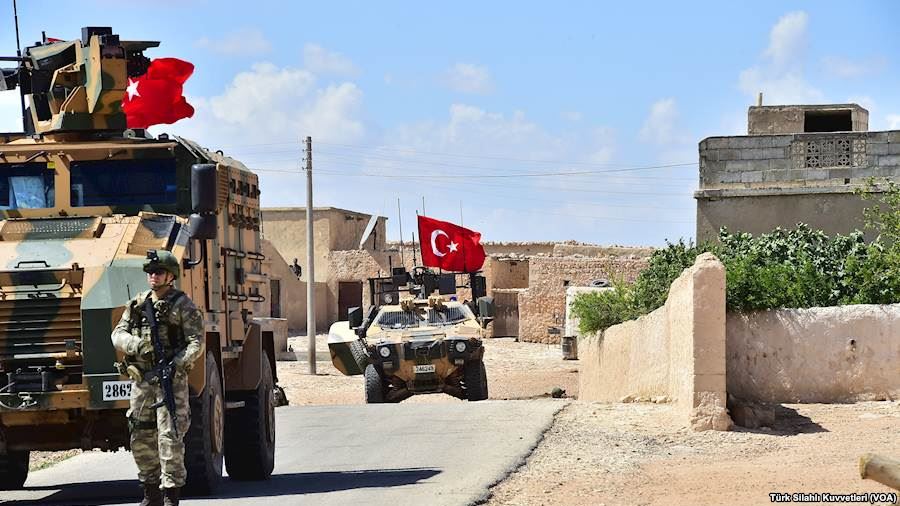Turkey’s Troubles in Idlib: Does Article 5 of the North Atlantic Treaty Hold the Answer?
Since a lethal airstrike against Turkish forces in Syria on Feb. 27, speculation has been rife as to whether Turkey could request military assistance under Article 5 of the North Atlantic Treaty. At least for now, such speculation is misplaced.

Published by The Lawfare Institute
in Cooperation With

More than 30 Turkish soldiers lost their lives in an air strike in northeastern Syria on Feb. 27. This represents the single largest combat loss sustained by Turkish troops since they intervened in the Syrian conflict four years ago. In response to the air strike, Turkish forces attacked Syrian regime targets, reportedly destroying large numbers of tanks, helicopters and other military hardware, as well as killing hundreds of personnel. Meanwhile Russia dispatched two frigates equipped with cruise missiles into the Mediterranean.
Although Turkey has struck Syrian government forces before, this latest incident demonstrates the very real risk of escalation that direct confrontation between Turkish and Syrian, and potentially Russian, forces presents. The geopolitical ramifications of such clashes are immense, not least due to Turkey’s membership in NATO. Indeed, speculation has been rife as to whether Turkey could request military assistance under Article 5 of the North Atlantic Treaty and, if Ankara were to do so, how other allies should respond.
At least for now, such speculation is misplaced, for the simple reason that Article 5 is not applicable in the present circumstances.
The North Atlantic Area
Although the North Atlantic Treaty is not directed against any specific adversary, its original purpose was to unite its signatories in an effort to confront the threat posed by the Soviet Union. This purpose produced two overarching membership criteria: NATO was intended to be a community of like-minded nations sharing common democratic ideals, yet the inclusion of a country had to make military and strategic sense too. As a result, NATO was conceived as an organization with regional, rather than potentially universal, membership. As the Washington Paper of September 1948, the first detailed outline of what later became the North Atlantic Treaty, recognized: “a line must be drawn somewhere” when it came to the geographic scope of NATO and its activities.
Eventually, that line was drawn in the form of Article 6 of the North Atlantic Treaty. Article 6 is the only provision of the agreement ever to be formally amended. In its original form, as adopted on April 4, 1949, it reads as follows:
For the purpose of Article 5, an armed attack on one or more of the Parties is deemed to include an armed attack on the territory of any of the Parties in Europe or North America, on the Algerian departments of France, on the occupation forces of any Party in Europe, on the islands under the jurisdiction of any party in the North Atlantic area north of the Tropic of Cancer, or the vessels or aircraft in this area of any of the parties.
Originally, the mutual defense commitment contained in Article 5 of the treaty could thus be triggered in five geographic scenarios. First, the commitment could be engaged by attacks on the territory of one or more of the signatories, provided those territories were located in Europe or North America. Overseas territories, other than islands in the North Atlantic area, were excluded. Second, by way of exception, attacks on the Algerian departments of France were included. Third, attacks on occupation forces of any party inside Europe could also trigger the mutual assistance commitment, even if such forces came under attack outside their own national territory. Fourth, islands in the North Atlantic area north of the Tropic of Cancer were covered. This means that the mutual defense commitment extends to Greenland, but not to Hawaii. Finally, attacks on vessels or aircraft present within this North Atlantic area also came under the umbrella of the mutual assistance guarantee.
The Accession Protocol
Turkey’s accession to the North Atlantic Treaty in 1952 necessitated a revision of Article 6. Turkey was not invited to join NATO as a founding member. At the time, the view prevailed that the country could not really be considered “as belonging to the Western European region.” Even as the strategic calculus swung in favor of admitting Turkey into NATO, these geographic reservations remained. The United States thus took the view that Article 6 in its original form covered only attacks on the “European area” of Turkey, but not attacks on Turkish territory that fell outside of Europe. To remedy this gap, the Protocol to the North Atlantic Treaty on the accession of Greece and Turkey, adopted on Oct. 17, 1951, revised Article 6 as follows:
For the purpose of Article 5, an armed attack on one or more of the Parties is deemed to include an armed attack:
- on the territory of any of the Parties in Europe or North America, on the Algerian Departments of France, on the territory of Turkey or on the islands under the jurisdiction of any of the Parties in the North Atlantic area north of the Tropic of Cancer;
- on the forces, vessels or aircraft of any of the Parties, when in or over these territories or any other area in Europe in which occupation forces of any of the Parties were stationed on the date when the Treaty entered into force or the Mediterranean Sea or the North Atlantic area north of the Tropic of Cancer.
The revised, currently applicable, text thus includes the entire territory of Turkey within the scope of application of Article 5 of the North Atlantic Treaty and clarifies that attacks on forces, vessels or aircraft of any of the parties in the Mediterranean Sea are covered too.
However, notwithstanding this revision, the duty to provide mutual assistance does not apply to attacks on the territory of Syria nor to attacks on forces, vessels of aircraft of any NATO member state, including Turkey, present inside Syrian territory. Matters would be different if Turkey’s territory were subject to an armed attack from within Syrian territory or if Turkish forces, vessels or aircraft were attacked in or over the Mediterranean Sea. However, this is not the case here. Accordingly, Turkey may not invoke Article 5 in the present circumstances.
In any event, even if the geographic conditions governing the application of Article 5 were met, the duty of mutual assistance is not triggered by the mere fact that Turkish forces have suffered combat losses. As the preamble, text and negotiating history of the North Atlantic Treaty make abundantly clear, any action under Article 5 involving the use of force would be an exercise of the right of individual or collective self-defense set out in Article 51 of the United Nations Charter. Article 5 of the North Atlantic Treaty does not supersede the conditions that govern the exercise of this right of self-defense under the charter or customary international law. Consequently, since self-defense is available only against an unlawful armed attack, but not against the lawful use of force in self-defense, the legality or illegality of the air strike carried out against Turkish forces has a bearing on whether Article 5 could be invoked by Turkey. In other words, if a NATO member state is the target of lawful self-defense rather than an unlawful armed attack, it cannot request support from its allies under Article 5 in response.
Consultations, Not Collective Self-Defense
Finally, it is important to emphasize that the geographic conditions imposed by Article 6 of the North Atlantic Treaty apply only to the mutual defense commitment set out in Article 5, but not to any other provision of the agreement. As Theodore C. Achilles, one of the original architects of the treaty, pointed out, “[T]here was never the slightest thought in the mind of the drafters that [Article 6] should prevent collective planning, manoeuvres or operations south of the Tropic of Cancer in the Atlantic Ocean, or in any other area important to the security of the Parties.” In other words, collective action other than action taken under Article 5 of the treaty may be described as “out-of-area,” but it is not off limits or ultra vires for NATO.
Nothing thus prevents an ally from requesting consultations pursuant to Article 4 of the North Atlantic Treaty in situations where it considers that events falling outside the geographic scope of Article 6 threaten its territorial integrity, political independence or security. Indeed, Turkey took this exact step and requested consultations on the situation in Syria. At an extraordinary meeting of the North Atlantic Council held on Feb. 28, 2020, the other member states offered their condolences, expressed their full solidarity with Turkey, and condemned the “continued indiscriminate air strikes by the Syrian regime and Russia” in Idlib province. However, Article 4 imposes no further obligations on them beyond this duty to enter into consultations.
Everything considered, the situation in Idlib demonstrates the flexibility of the North Atlantic Treaty and the foresight of its drafters: The treaty applies to these circumstances and can be as relevant as the allies wish it to be, without committing them to any automatic action.





